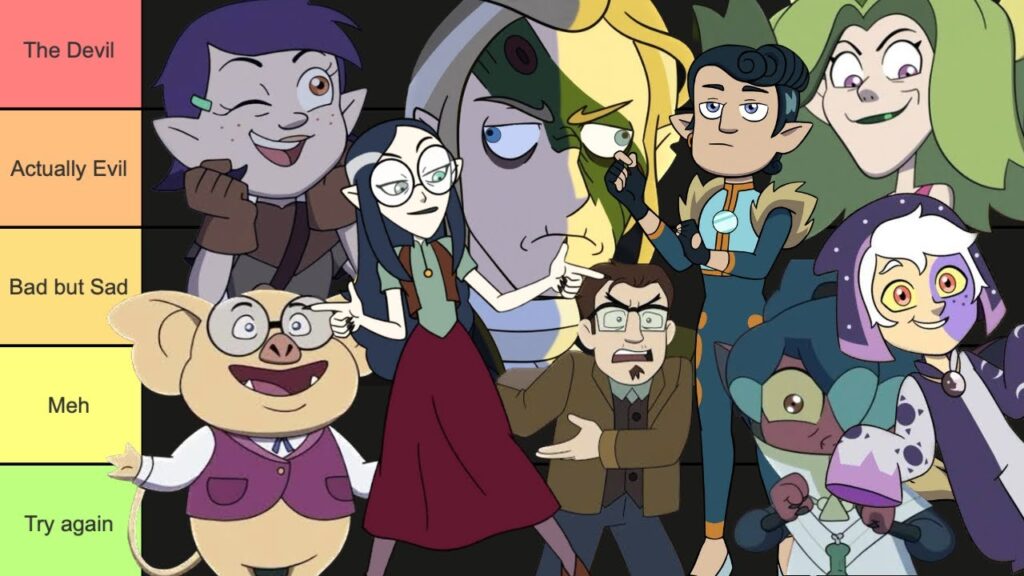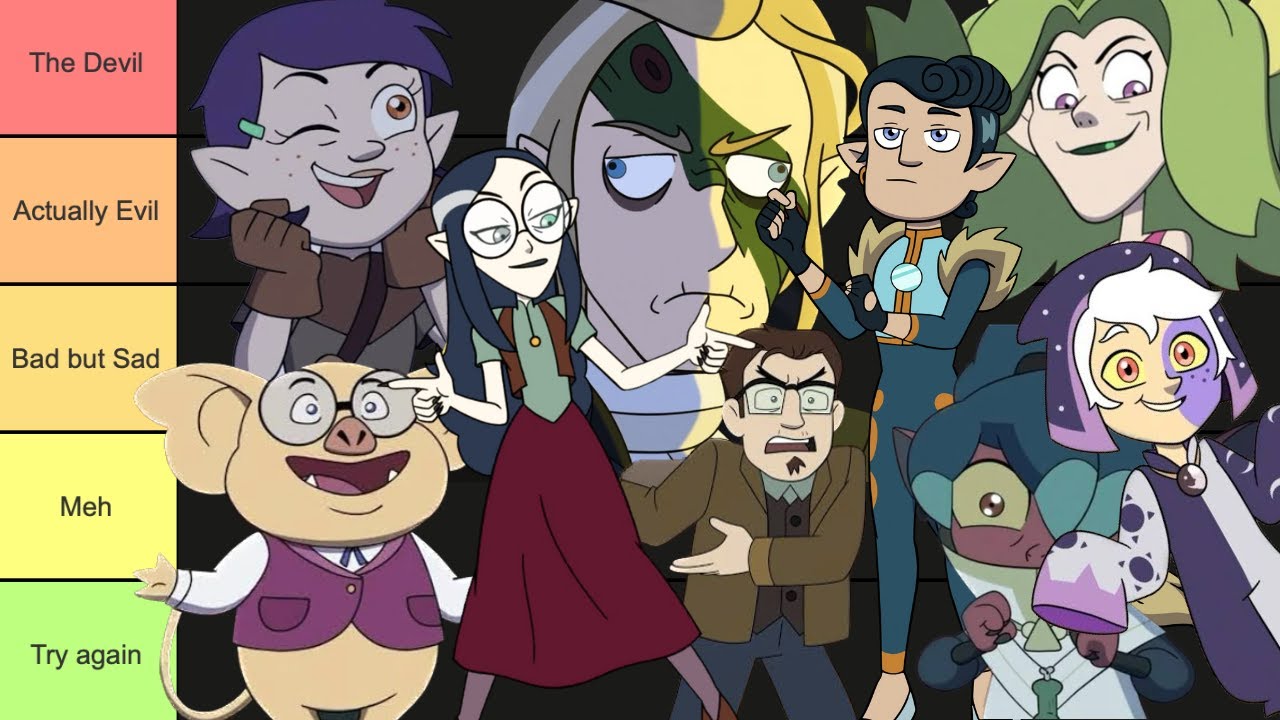
The Owl House Villains: A Deep Dive into the Antagonists of the Boiling Isles
The Owl House, created by Dana Terrace, captivated audiences with its unique blend of fantasy, humor, and heart. Central to its compelling narrative are the memorable and multifaceted villains who challenged Luz Noceda and her allies. This article provides an in-depth exploration of the key antagonists in The Owl House, examining their motivations, actions, and impact on the overall story. We’ll delve into the complexities of these Owl House villains, analyzing what made them effective and how they contributed to the show’s overarching themes.
Emperor Belos: The Tyrant of the Boiling Isles
Undeniably the primary antagonist of The Owl House, Emperor Belos, also known as Philip Wittebane, stands out for his calculated cruelty and deeply rooted prejudices. Originally a human from the 17th century, Philip’s journey to the Boiling Isles and his subsequent transformation into Belos are steeped in tragedy and a thirst for power. His motivations are driven by a fervent belief that wild magic is inherently evil and must be eradicated, a conviction stemming from a traumatic past involving his brother, Caleb, and a witch he loved.
Belos’s methods are characterized by manipulation, deception, and authoritarian rule. He established the Emperor’s Coven, a system designed to control and suppress wild magic, offering witches the opportunity to join covens and limit their magical abilities in exchange for security and status. However, this system was ultimately a tool for Belos to consolidate his power and prepare for the Day of Unity, a plan to drain all wild magic and destroy the Boiling Isles, thereby eliminating what he perceived as a threat to the human world. The Owl House villains rarely exhibit such a long-term and devastating plan.
Belos’s Powers and Abilities
- Magic Absorption: Belos could absorb magic from palismans and witches, extending his lifespan and enhancing his power.
- Transformation: Over time, Belos’s body deteriorated due to the wild magic he absorbed, leading to grotesque transformations.
- Deception and Manipulation: His ability to manipulate others, particularly Hunter, was a key component of his strategies.
Lilith Clawthorne: From Antagonist to Ally
Initially presented as an antagonist, Lilith Clawthorne’s character arc is one of redemption and growth. As the head of the Emperor’s Coven and Eda’s older sister, Lilith was initially portrayed as a strict and ambitious witch loyal to Belos. Her motivations were complex, driven by a desire for power and recognition, as well as a deep-seated guilt over cursing Eda years prior. This curse resulted in Eda’s transformation into the Owl Beast, and Lilith joined Belos in hopes of finding a cure.
However, as the series progresses, Lilith’s allegiance to Belos begins to waver. She witnesses firsthand the Emperor’s cruelty and the true extent of his plans. Her guilt over cursing Eda intensifies, leading her to betray Belos and ultimately join forces with Luz and her friends. Lilith’s journey from antagonist to ally highlights the themes of forgiveness, redemption, and the importance of choosing one’s own path. While initially one of the Owl House villains, her arc showcased the potential for change.
Lilith’s Redemption
- Betrayal of Belos: Lilith’s decision to betray Belos marked a turning point in her character arc.
- Sacrifice: She shared Eda’s curse, weakening Belos and allowing Eda to control her transformation.
- Mentorship: Lilith became a mentor to Luz, sharing her knowledge of magic and helping her develop her abilities.
Kikimora: The Ambitious Lackey
Kikimora, often referred to as Kiki, serves as a prominent secondary antagonist throughout The Owl House. As Belos’s loyal assistant and a high-ranking member of the Emperor’s Coven, Kikimora is characterized by her ambition, ruthlessness, and unwavering devotion to the Emperor. Her motivations are rooted in a desire for power and recognition, fueled by a deep-seated insecurity and a need to prove herself.
Kikimora’s actions are often driven by a desire to impress Belos and climb the ranks within the Emperor’s Coven. She is willing to resort to any means necessary to achieve her goals, including manipulation, sabotage, and outright violence. However, her ambition often blinds her to the bigger picture, and she consistently underestimates the capabilities of Luz and her friends. While not as powerful as Belos, Kikimora’s relentless pursuit of power makes her a formidable adversary. She is a prime example of how Owl House villains come in all shapes and sizes.
Kikimora’s Downfall
- Overconfidence: Kikimora’s overconfidence often leads to her downfall.
- Betrayal by Belos: Belos eventually discards Kikimora when she is no longer useful.
- Obsession with Power: Her obsession with power blinds her to the consequences of her actions.
Hunter (The Golden Guard): A Pawn in Belos’s Game
Hunter, initially known as the Golden Guard, is a complex character who begins as an antagonist but ultimately becomes an ally. Created by Belos as a grimwalker, a clone of Philip’s deceased brother Caleb, Hunter was raised to be loyal to the Emperor and to serve as his right-hand man. His motivations are initially driven by a desire to please Belos and to earn his approval, as he believes that this is the only way to secure his place in the world.
However, as Hunter spends more time with Luz and her friends, he begins to question Belos’s methods and his own identity. He discovers the truth about his origins and the Emperor’s true intentions, leading him to betray Belos and join forces with the protagonists. Hunter’s journey is one of self-discovery and liberation, as he learns to embrace his own identity and to forge his own path. He exemplifies the idea that even those initially presented as Owl House villains can find redemption.
Hunter’s Transformation
- Discovery of His Origins: Learning about his origins as a grimwalker was a pivotal moment for Hunter.
- Relationship with Luz and Friends: His relationships with Luz, Willow, and Gus helped him to see the world differently.
- Rejection of Belos: Hunter’s ultimate rejection of Belos marked his transformation into an ally.
The Collector: An Unpredictable Force
The Collector is a powerful and enigmatic being who serves as a late-series antagonist. Imprisoned for centuries, the Collector is childlike in nature but possesses immense power and a lack of understanding of the consequences of their actions. Their motivations are driven by a desire for entertainment and companionship, leading them to manipulate and play with the inhabitants of the Boiling Isles.
The Collector’s actions are often unpredictable and chaotic, making them a dangerous and formidable adversary. While not inherently malicious, their lack of understanding of the world and their immense power make them a threat to the stability of the Boiling Isles. The Collector represents a different kind of villain, one driven by naiveté and a desire for connection rather than malice. Understanding the motivations of Owl House villains like The Collector requires a nuanced approach.
The Collector’s Impact
- Chaos and Destruction: The Collector’s actions lead to widespread chaos and destruction.
- Manipulation of Others: They manipulate others for their own amusement.
- Lack of Understanding: Their lack of understanding of the consequences of their actions makes them dangerous.
Other Notable Antagonists
While Belos, Lilith (initially), Kikimora, Hunter (initially), and The Collector are the primary antagonists, The Owl House also features a number of other notable antagonists who contribute to the overall conflict.
- Warden Wrath: A loyal servant of Belos, Warden Wrath is a stern and imposing figure who enforces the Emperor’s rules.
- The Abomatons: Animated constructs created by Alador Graye, the Abomatons serve as enforcers and soldiers for the Emperor’s Coven.
The Impact of The Owl House Villains
The Owl House villains are not simply one-dimensional antagonists; they are complex and multifaceted characters with their own motivations, flaws, and vulnerabilities. Their actions drive the plot forward, challenge the protagonists, and explore the themes of power, control, redemption, and the importance of choosing one’s own path. The show masterfully portrays how even the most villainous characters can have sympathetic qualities, and how even those who start as antagonists can find redemption. The impact of these villains extends beyond the immediate conflict, leaving a lasting impression on the characters and the world of the Boiling Isles. They are a crucial part of what makes The Owl House such a compelling and thought-provoking series. [See also: The Owl House Characters: A Comprehensive Guide]
In conclusion, the antagonists of The Owl House are integral to the show’s success. From the tyrannical Emperor Belos to the unpredictable Collector, each villain brings a unique set of challenges and complexities to the story. Their motivations, actions, and ultimate fates contribute to the show’s overarching themes and leave a lasting impact on the audience. The Owl House villains are a testament to the power of nuanced storytelling and the importance of exploring the complexities of good and evil. Understanding these Owl House villains allows for a deeper appreciation of the show’s narrative and its impact.

